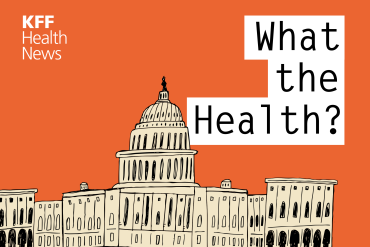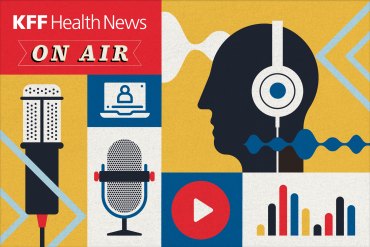Your Neighbor Has Backyard Chickens. Should You Be Worried?
The latest outbreak of bird flu has upended egg, poultry, and dairy operations, sickened dozens of farmworkers, and killed at least one person in the U.S. KFF Health News national public health correspondent Amy Maxmen explains why scientists are worried.
How the FDA Opens the Door to Risky Chemicals in America’s Food Supply
The FDA has relied on food companies for decades to determine whether their ingredients are safe. Some chemicals and additives are tied to health risks while others are absent from product labels.
MRNA Vaccines, Once a Trump Boast, Now Face Attacks From Some in GOP
Republicans have proposed legislation in several states to ban the pioneering technology used in covid shots. Many doctors worry a huge medical advance could be rolled back.
Marty Makary, Often Wrong as Pandemic Critic, Is Poised To Lead the FDA He Railed Against
Should Marty Makary take the reins at the FDA, transitioning from gadfly to the head of an agency that regulates a fifth of the U.S. economy, he would have to engage in the thorny challenges of governing.
What the Health? From KFF Health News: The State of Federal Health Agencies Is Uncertain
The Supreme Court opined for the first time that Trump administration officials may be exceeding their authority to reshape the federal government by refusing to honor completed contracts, even as lower-court judges started blocking efforts to fire workers, freeze funding, and cancel ongoing contracts. Meanwhile, public health officials are alarmed at the Department of Health and Human Services’ public handling of Texas’ widening measles outbreak, particularly the secretary’s less-than-full endorsement of vaccines. Lauren Weber of The Washington Post, Joanne Kenen of the Johns Hopkins University School of Public Health and Politico Magazine, and Stephanie Armour of KFF Health News join KFF Health News’ Julie Rovner to discuss these stories and more.
For Seniors With Hoarding Disorder, a Support Group Helps Confront Stigma and Isolation
Hoarding disorder disproportionately affects older people. As baby boomers age, it is a growing public health concern. Effective treatments are scarce, and treating hoarding can require expensive interventions that drain municipal resources. Some experts fear a coming crisis.
CDC Firings Undermine Public Health Work Far Beyond Washington
The Trump administration’s sudden firings have gutted training programs across the nation that bolstered state and local public health departments.
Journalists Discuss a Mysterious, Deadly Illness in Congo and Early Moves by Secretary RFK
KFF Health News journalists made the rounds on national and local media recently to discuss topical stories. Here’s a collection of their appearances.
Human, Bird, or Dog Waste? Scientists Parsing Poop To Aid DC’s Forgotten River
A huge infrastructure project coupled with a new scientific review of microbes in the water could be bringing Washington, D.C., closer to a once-unimaginable goal — a safely swimmable Anacostia River.
Debido a los riesgos para la salud, no se puede nadar en el Anacostia desde hace más de medio siglo. El agua contaminada puede causar enfermedades gastrointestinales y respiratorias, así como infecciones oculares, nasales y cutáneas.
Los Angeles County Has Cut Homelessness, but Wildfires Threaten To Erase That Gain
As Los Angeles recovers from historic wildfires, both previously unsheltered and chronically homeless people are facing even greater instability. Some lawmakers and providers argue now is the time to put in even more resources to maintain the progress the county and state have made in fighting the crisis.
With RFK Jr. in Charge, Supplement Makers See Chance To Cash In
The FDA is already limited in policing claims of health benefits by makers of supplements and herbal remedies — a $70 billion industry. Get ready for even less regulation.
Journalists Discuss Health Care for Incarcerated Children and the Possibility of a Bird Flu Pandemic
KFF Health News journalists made the rounds on national and local media recently to discuss topical stories. Here’s a collection of their appearances.
Texas Measles Outbreak Nears 100 Cases, Raising Concerns About Undetected Spread
Health officials expect a measles outbreak in West Texas to exceed 100 cases because of low vaccination rates and undetected infections. Vaccine misinformation and new laws may make such situations more common and harder to contain.
What the Health? From KFF Health News: Medicaid in the Crosshairs, Maybe
President Donald Trump has said he won’t support major cuts to the Medicaid health insurance program for people with low incomes, but he has endorsed a House budget plan that calls for major cuts, leaving the program’s future in doubt. Meanwhile, thousands of workers at the Department of Health and Human Services were fired over the holiday weekend, from the National Institutes of Health, the FDA, and the Centers for Disease Control and Prevention, with possibly more cuts to come.
Alice Miranda Ollstein of Politico, Joanne Kenen of the Johns Hopkins Bloomberg School of Public Health and Politico Magazine, and Sarah Karlin-Smith of the Pink Sheet join KFF Health News’ Julie Rovner to discuss these stories and more.
An Ice Rink To Fight Opioid Crisis: Drug-Free Fun vs. Misuse of Settlement Cash
A decision about how to spend settlement funds in Carter County, Kentucky, which was hit hard by the opioid epidemic, offers a window into the choices that surround this windfall.
The Covid ‘Contrarians’ Are in Power. We Still Haven’t Hashed Out Whether They Were Right.
Jay Bhattacharya, nominated to lead the National Institutes of Health, opposed most covid mandates. Without an honest public debate about what worked and what didn’t, public health experts say, we’re even less prepared for the next pandemic.
Journalists Talk Southern Health Care: HIV Drug Access, Medicaid Expansion, Vaccination Rates
KFF Health News journalists made the rounds on national and local media recently to discuss topical stories. Here’s a collection of their appearances.
Sights, Sounds Trigger Trauma for Super Bowl Parade Shooting Survivors
Survivors and witnesses of gun violence often freeze emotionally at first, as a coping mechanism. As the one-year mark since the parade shooting nears, the last installment in our series “The Injured” looks at how some survivors talk about resilience, while others are desperately trying to hang on.
Urgent CDC Data and Analyses on Influenza and Bird Flu Go Missing as Outbreaks Escalate
Delays in urgent CDC analyses of seasonal flu and bird flu, and the agency’s silence, will harm Americans as outbreaks escalate, doctors and public health experts warn.























